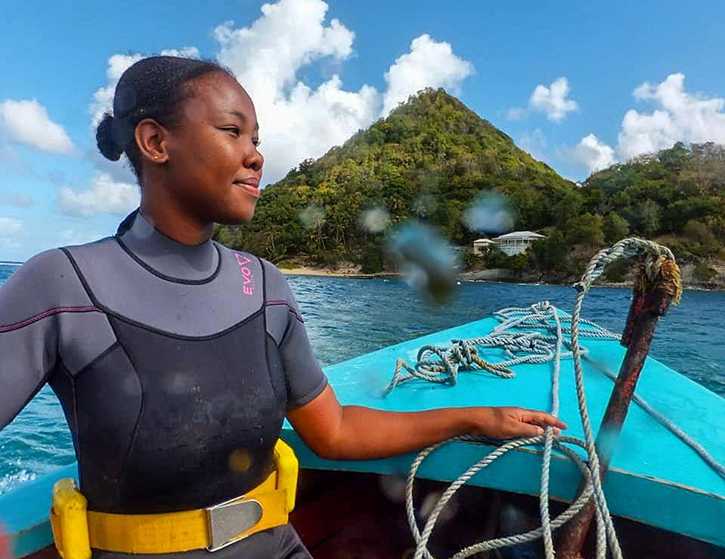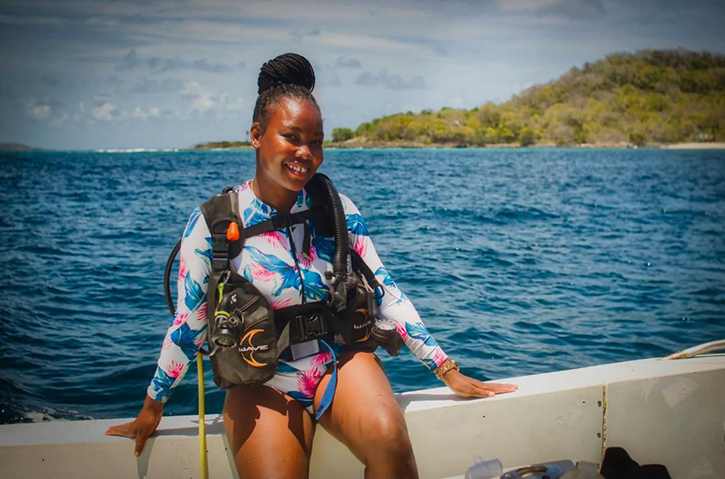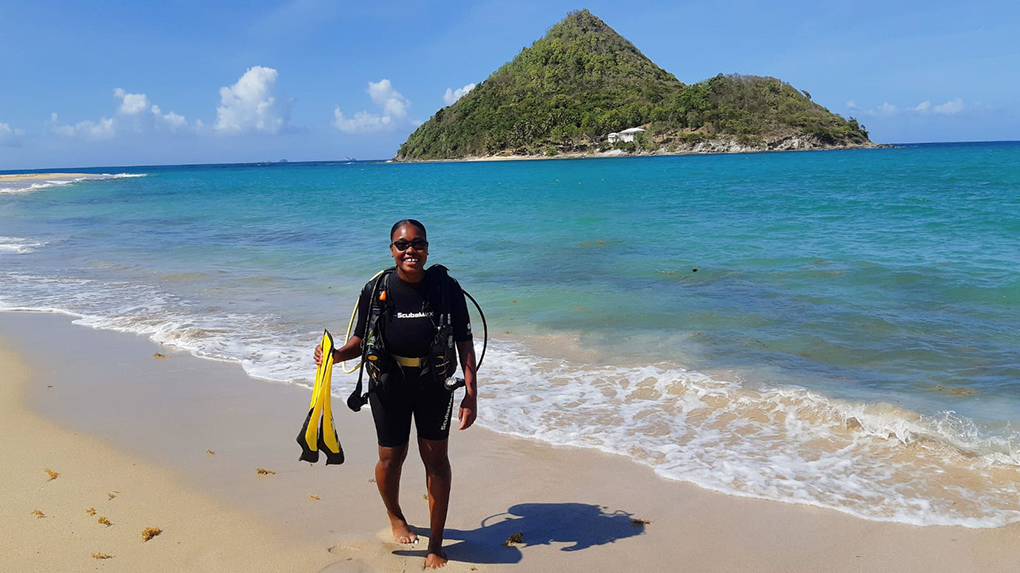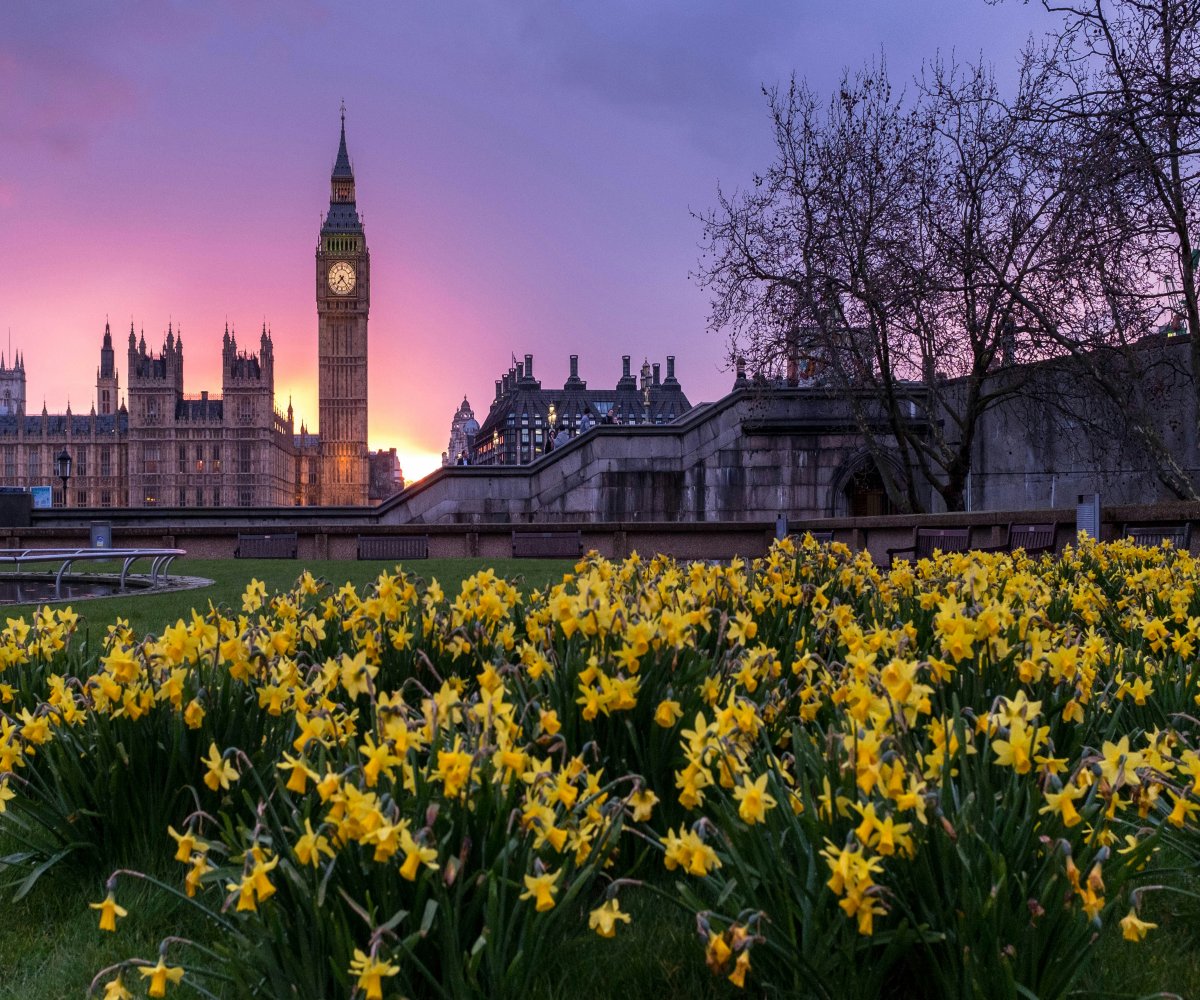Reene Smith is a marine biologist and PADI dive master assistant. Growing up on the small Caribbean island of Grenada, The 26-year-old has always been passionate about the marine environment.
“This small island is made up of pristine white and black sand beaches with amazing aquatic ecosystems, from wetlands to coral reefs, that create habitats for an array of organisms,” said Reene. “I have spent most of my childhood years on the beach. There’s no better place to spend your time while living on an island.”
Completing her associate’s degree in sociology and geography, Reene became more aware of the impact humans have on the environment. Hence, she was compelled to pursue a bachelor of science focused on marine, wildlife, and conservation biology at Grenada’s St. George’s University.
“Though science was not my strong suit, I was still determined to learn. I would say the passion for marine science came from experiencing the human impacts on these valuable ecosystems and seeing how they have changed over the years. Throughout my studies, I have become increasingly familiar with concepts and key issues related to tropical marine ecology and the impacts of climate change on fisheries, fish physiology, and ecology.”

Reene intends to pursue graduate studies in environmental remediation and pollution control, and hopes to investigate how human impacts affect the community structure of marine ecosystems. This ambitious young marine biologist is eager to turn her passion for marine and wildlife conservation into a career where she can potentially help mitigate environmental issues caused by human activities.
Along with her academic studies, in 2015, Reene started her scuba diving journey. Her diving experience has allowed her to interact with a wealth of marine species, including sharks, sea turtles, dolphins, and rays, at maximum depths of 130 feet.
In fact, sea turtles are some of her favorite sea creatures to observe. From the significant ecological functions that they pose on the marine ecosystem, to watching them nest on the shore and observing them in the wild, Reene finds them to be a very interesting species. She is also a fan of observing dolphins.
“Scuba diving with dolphins in the wild is an amazing experience. They’re very friendly and curious animals. I’ve had one encounter with three dolphins that appeared to be a family. The experience was very astonishing as they’re very playful.”
Having had the opportunity to explore coral reefs and deep-sea wrecks in Carriacou, Petite Martinique, The Grenadines, Canary Islands, Barbados, and Turks and Caicos, when it comes to her favorite diving spots, Reene’s home country Grenada still tops her list.
Among her favorite dive spots in Grenada are the Bianca C shipwreck. Located on the ocean floor at 213 feet, approximately two miles offshore, Bianca C was an Italian crew ship that sank in Grenada on October 22, 1961.
The largest shipwreck in the region, Bianca C is referred to as the ‘Titanic of the Caribbean.’ Here, Reene has had the opportunity to encounter spotted eagle rays, sea turtles, and barracudas.

King Mitch is another shipwreck Renee enjoys exploring. It lies in 120 feet of water, approximately 100 miles off of the Atlantic coast of Grenada.
“Diving the King Mitch shipwreck can be thrilling and challenging. It lies in strong currents and surface swells. The dive gets more thrilling as the wreck is surrounded by black and white-tip reef sharks, nurse sharks, turtles, and schools of spotted eagle rays.”
Another favorite Grenada diving spot for Reene is Flamingo Bay. A fringing reef with a steep gradient that starts at 15 feet and goes all the way down to 70 feet, this dive site is part of Grenada’s Marine Protected Area.
“I love diving in Flamingo Bay, as I enjoy being surrounded by the immense diversity of marine flora and fauna, from juvenile reef species to corals and sponges. The glistening rays of the sun and the vibrant color contrast of the reef creates a peaceful and picturesque ambiance.”
Ever in search of captivating new dive experiences, Reene has a bucket list of places she would one day like to dive. The top four places on her list are Ecuador’s Galápagos Islands, Australia’s Great Barrier Reef, Mexico, and Madagascar.
“The Great Barrier Reef and the Galápagos Islands are listed as UNESCO World Heritage sites. After reading about both locations in the textbooks, it will be an absolute pleasure to scuba dive and experience the rich diversity of species in these locations.”
“Mexico has the largest whale shark aggregation site in the world, so I would love to get the opportunity to dive there. Madagascar is home to the world’s third-largest coral reef system, as well as the highest level of endemic reef species, meaning that you won’t find them anywhere else in the world. If I can dive in every dive-friendly place I visit, I probably will.”
For Reene, diving and being amidst nature brings her a sense of peace and clarity while she deals with the hardships of everyday life. It allows her to momentarily clock out of our fast-paced world, which sometimes leaves her feeling burnt out, overwhelmed, and anxious.
“It forms a sense of balance and allows me to create a natural state of meditation and inner peace by just gazing at the sunset or trekking through the forest.”
Reene is currently planning for her upcoming trip to Norway in January. You can follow her on her dives and travels at @wanderer.reene.
Related: Diving With A Purpose: The Black Scuba Divers Documenting Slave Shipwrecks





